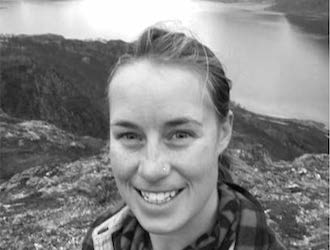Karen Filbee-Dexter
Karen
Filbee-Dexter
Post-Doctoral Fellow
Phone : 418-656-2131
Fax : 418-656-2339

Education:
Doctor of Philosophy (Biology) Dalhousie University, Halifax, NS / 2010 – August 31st, 2016 Thesis: Role of deep-living sea urchins in alternative state dynamics of kelp ecosystems
Honours Bachelor of Science (Biology), Dalhousie University, Halifax, NS / Graduated 2010 (GPA 4.26 / 4.30)
Experience and Affiliations:
Jan 2019-Dec 2020: Postdoctoral fellow at Université Laval, department de Biologie. (NSERC PDF)
Field and modelling research on status and trends of arctic kelp forests in Canada, Norway and Greenland.
Oct 2018-Dec 2018: Researcher at Institute of Marine Research Norway (IMR)
Field ecologist with the Benthic Communities Research Group studying coastal habitats
Oct 2016-Sept 2018: KELPEX Postdoctoral researcher at Norwegian Institute for Water Research (NIVA)
KELPEX quantified detrital kelp production and export in Arctic Norway.
Aug 2016- Sep 2016 World Wildlife Fund Canada Research Contract, Sambro Benthic Diversity Studies
Expertise and Distinctions:
Expertise on drivers and patterns of long-term change in coastal ecosystems.
• Total of 21 scientific publications, including 1 book chapter & 1 scientific report; 2.5 years post-PhD.
• 319 citations, H-index of 7 (Google Scholar 10/2/2019).
• 2019 Opinion Piece in Washington Post (‘Part of our Ocean is Dying’)
• Lead author of interdisciplinary collaborations with researchers in social science & philosophy
• Scientific diver with >450 scientific dives, boating experience, and 200 days field work in the Arctic
Selected publications:
- Wernberg T, Krumhansl, K, Filbee-Dexter K, and Pedersen, M. (2019) Status and trends for the world’s kelp forests. In: World Seas: An Environmental Evaluation, Vol III, 2e. Ed. C. Sheppard. Elsevier.
- Wernberg T, Filbee-Dexter K. 2019. Missing the marine forests for the trees. MEPS. 8: 17180. 33
- Filbee-Dexter K, et al. (2019) Arctic kelp forests: resilience and future. Glob Planetary Change 172:1-14.
- Filbee-Dexter K, Smajdor A. 2019. Ethics of assisted evolution in marine conservation. Frontiers in Marine Science. 6 :20.
- Wernberg T, Filbee-Dexter K. 2019. Grazers extend blue carbon transfer by slowing sinking speeds of kelp detritus. Scientific Reports. 8, 17180.
- Filbee-Dexter K, Wernberg T (2018) Rise of turfs: a new battle front of globally declining kelp forests. BioScience. 68: 64–76.
- Filbee-Dexter K, Wernberg T, Norderhaug KM, Ramirez-Llodra E, Pedersen MF. 2018. Movement of pulsed resource subsidies from kelp forests to deep fjords. Oecologia. 187: 291-304
- Filbee-Dexter K, Symons C, Jones K, Haig H, Pittman J, Alexander S, Burke M (2018) Quantifying ecological and social drivers of ecological surprise. Journal of Applied Ecology. 55: 2135-2146
- Filbee-Dexter K, Scheibling RE (2017). The past is the key to the present: linking regime shifts in kelp beds to the current distribution of deep-living sea urchins. Ecology. 98: 253-264.
- Filbee-Dexter K, Feehan CJ, and Scheibling RE (2016). Large-scale degradation of a kelp ecosystem in an ocean warming hotspot. Marine Ecology Progress Series. 543: 141-152.
- Filbee-Dexter K, Scheibling RE (2014b). Detrital kelp subsidy supports high reproductive output of deep-living sea urchins in a sedimentary basin. Aquatic Biology. 23: 71-86. [IF = 1.3]
- Filbee-Dexter K, Scheibling RE (2016). Spatial patterns and predictors of drift algal subsidy in deep subtidal environments. Estuaries and Coasts. 39: 1724-1734. [IF = 2.2]
- Filbee-Dexter K, Scheibling RE (2012). Hurricane-mediated defoliation of kelp beds and pulsed delivery of kelp detritus to offshore sedimentary habitats. Marine Ecology Progress Series. 455: 51-64. [IF = 2.3]





